| Listing 1 - 10 of 38 | << page >> |
Sort by
|
Book
ISBN: 2845865422 9782845865426 Year: 2004 Publisher: Paris : Amsterdam : Karthala Sephis,
Abstract | Keywords | Export | Availability | Bookmark
 Loading...
Loading...Choose an application
- Reference Manager
- EndNote
- RefWorks (Direct export to RefWorks)
Colonies --- Despotism --- Democracy --- Apartheid --- Despotisme --- Démocratie --- Administration --- Africa --- Afrique --- Colonial influence --- Politics and government --- Influence coloniale --- Politique et gouvernement --- Relations villes-campagnes --- Geografie --- Sociale geografie --- Politieke Geografie. --- Démocratie --- Administration. --- Influence coloniale.
Book
ISBN: 9782296992894 2296992897 Year: 2012 Publisher: Paris : l'Harmattan,
Abstract | Keywords | Export | Availability | Bookmark
 Loading...
Loading...Choose an application
- Reference Manager
- EndNote
- RefWorks (Direct export to RefWorks)
37 <6> --- Opvoeding en onderwijs --(algemeen)--Afrika --- 37 <6> Opvoeding en onderwijs --(algemeen)--Afrika --- Postcolonialisme. --- Éducation --- Éducation. --- Afrique --- Afrique. --- Influence coloniale. --- Books before 1840 --- Education --- Africa --- Colonial influence.
Book
ISBN: 9782271144256 2271144256 Year: 2022 Publisher: Paris : CNRS Éditions,
Abstract | Keywords | Export | Availability | Bookmark
 Loading...
Loading...Choose an application
- Reference Manager
- EndNote
- RefWorks (Direct export to RefWorks)
Comment s'est construit, au fil du XXe siècle et jusqu'à nos jours, le gouvernement de "la" nature en Asie, en Afrique et au Moyen-Orient ? De la création des premières réserves de chasse dans les colonies africaines au nom de la protection de la faune aux modèles actuels de conservation communautaire privilégiés par les organisations internationales, cette ambitieuse recherche croisant histoire, géographie, science politique et écologie, revient sur les négociations et luttes provoquées par le "colonialisme vert". Qu'il s'agisse de la gestion impériale des forêts à Singapour ou au Liban, de l'introduction de nouvelles espèces dans l'Afrique coloniale française ou de la promotion de la "récolte" de la grande faune, des conflits contemporains autour du tigre, de l'éléphant et du crocodile marin en Inde, ces études font ressortir l'entremêlement des temps coloniaux et post-coloniaux. Avant comme après les indépendances, protéger la nature, c'est exercer le pouvoir. Et hier comme aujourd'hui, la conservation globale de la nature aux Suds évolue au rythme d'une contradiction permanente entre prédation et protection.
#SBIB:39A4 --- #SBIB:39A75 --- #SBIB:39A73 --- #SBIB:93H3 --- Toegepaste antropologie --- Etnografie: Azië --- Etnografie: Afrika --- Thematische geschiedenis --- Environmental policy --- Environmental protection --- Environmental management --- Colonies. --- Réserves naturelles --- Animaux --- Colonisation --- Postcolonialisme. --- Parcs nationaux --- Environnement --- Gestion de l'environnement. --- Nature --- Protection --- Influence coloniale. --- Aspect environnemental. --- Aspect politique. --- Influence coloniale --- Histoire.
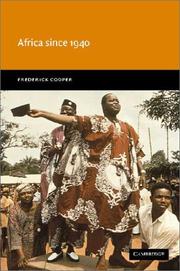
ISBN: 0521776007 0521772419 0521533074 110770233X 110759572X 0511800290 Year: 2002 Publisher: Cambridge Cambridge University Press
Abstract | Keywords | Export | Availability | Bookmark
 Loading...
Loading...Choose an application
- Reference Manager
- EndNote
- RefWorks (Direct export to RefWorks)
Politics --- History of Africa --- Africa --- Decolonization --- Décolonisation --- History --- Histoire --- Afrique --- Politics and government --- Colonial influence. --- Politique et gouvernement --- Influence coloniale --- Décolonisation --- Sovereignty --- Autonomy and independence movements --- Colonization --- Postcolonialism
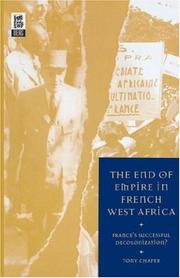
ISBN: 1859735525 1859735576 Year: 2002 Publisher: Oxford Berg
Abstract | Keywords | Export | Availability | Bookmark
 Loading...
Loading...Choose an application
- Reference Manager
- EndNote
- RefWorks (Direct export to RefWorks)
966 --- 966 Geschiedenis van West-Afrika --- Geschiedenis van West-Afrika --- Decolonization --- Décolonisation --- Africa, French-speaking West --- France --- Afrique occidentale francophone --- History --- Colonial influence. --- Colonies --- Histoire --- Influence coloniale --- Sovereignty --- Autonomy and independence movements --- Colonization --- Postcolonialism --- French-speaking West Africa
Book
ISBN: 9781107070318 9781107707382 9781107680883 1107707382 9781108695664 1108695663 1108588018 1107070317 1107680883 Year: 2018 Publisher: Cambridge Cambridge University Press
Abstract | Keywords | Export | Availability | Bookmark
 Loading...
Loading...Choose an application
- Reference Manager
- EndNote
- RefWorks (Direct export to RefWorks)
How did decolonization impact on Britain itself? And how did Britain manage its transition from colonial power to postcolonial nation? Sarah Stockwell explores this question principally via the history of the overseas engagements of key institutions that had acquired roles within Britain's imperial system: the Universities of Oxford and Cambridge, the Bank of England, the Royal Mint, and the Royal Military Academy Sandhurst. Using a huge range of fresh archival sources, the author shows how these institutions fashioned new roles at the end of empire, reconfiguring their activities for a postcolonial world and deploying their expertise to deliver technical assistance essential for the development of institutions in new Commonwealth states. This study not only pioneers an entirely new approach to the history of the British end of the British empire, but also provides an equally novel cross-sectoral analysis of institution-building during decolonization and highlights the colonial roots of British postcolonial aid.
Institution building --- Postcolonialism --- History. --- Great Britain --- Colonies --- Colonial influence --- Postcolonialisme --- Histoire --- Grande-Bretagne --- Influence coloniale --- Histoire. --- Social change --- Social institutions --- Social policy --- Post-colonialism --- Postcolonial theory --- Political science --- Decolonization --- Colonies britanniques
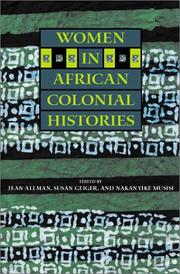
ISBN: 025310887X 9780253108876 0253215072 9780253215079 0253340470 9780253340474 Year: 2002 Publisher: Bloomington Indiana University Press
Abstract | Keywords | Export | Availability | Bookmark
 Loading...
Loading...Choose an application
- Reference Manager
- EndNote
- RefWorks (Direct export to RefWorks)
How did African women negotiate the complex political, economic, and social forces of colonialism in their daily lives? How did they make meaningful lives for themselves in a world that challenged fundamental notions of work, sexuality, marriage, motherhood, and family? By considering the lives of ordinary African women -- farmers, queen mothers, midwives, urban dwellers, migrants, and political leaders -- in the context of particular colonial conditions at specific places and times, Women in African C
Women --- Human females --- Wimmin --- Woman --- Womon --- Womyn --- Females --- Human beings --- Femininity --- History. --- Africa --- Colonial influence. --- Social science --- Women. --- Women's studies. --- History --- Africa. --- Femmes --- Histoire --- Afrique --- Influence coloniale --- Gender --- Colonialism --- Images of women
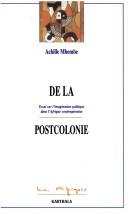
ISBN: 2845860781 9782845860780 Year: 2005 Publisher: Paris Karthala
Abstract | Keywords | Export | Availability | Bookmark
 Loading...
Loading...Choose an application
- Reference Manager
- EndNote
- RefWorks (Direct export to RefWorks)
Tenir un discours raisonnable sur l'Afrique subsaharienne ne va pas de soi, tant l'Afrique est considérée dans le discours occidental comme l'Autre absolu et jamais pour elle-même. Ces études montrent les conséquences de l'extrémisme de tels discours. A partir du thème de la contemporanéité, elles cherchent à rendre compte de quelques formes de l'imagination politique, sociale et culturelle.
Thematology --- Sociology of literature --- Political philosophy. Social philosophy --- Africa --- Pratiques politiques --- Afrique noire --- 323 <6> --- #SBIB:327.4H21 --- -Post-colonialism --- Kolonisatie / dekolonisatie / post-kolonisatie --- -Postcolonialism --- -Etnografie: Afrika --- Culture politique --- Postcolonialisme --- Pouvoir (sciences sociales) --- Afrique --- Influence coloniale --- Politique et gouvernement --- Postcolonialism --- Africa, Sub-Saharan --- Politics and government --- Social conditions --- #SBIB:39A73 --- Post-colonialism --- Postcolonial theory --- Political science --- Decolonization --- Etnografie: Afrika --- Afrique subsaharienne --- Conditions sociales --- Postcolonialisme. --- Influence coloniale. --- Postcolonialism - Africa, Sub-Saharan --- Colonialisme --- Africa, Sub-Saharan - Politics and government - 1960 --- -Africa, Sub-Saharan - Social conditions - 1960 --- -Afrique
Book
ISBN: 9783506760456 3506760459 9783657760459 3657760458 Year: 2021 Publisher: Paderborn Brill | Schöningh
Abstract | Keywords | Export | Availability | Bookmark
 Loading...
Loading...Choose an application
- Reference Manager
- EndNote
- RefWorks (Direct export to RefWorks)
Der Glaube an die Segnungen, aber auch die Zwangsläufigkeit des technischen Fortschritts entwickelte sich in der Phase des Hochimperialismus zu einer wirkmächtigen Ideologie, von der auch deutsche Ingenieure profitierten.Das Buch legt den Schwerpunkt der Analyse auf die ehemaligen Kolonien Deutsch Ost- und Deutsch-Südwestafrika. Der Fokus liegt dabei auf der Gruppe der technischen Experten, die mit dem Bau von Eisenbahnen, Straßen und Häfen einen entscheidenden Anteil an der Machtsicherung, Erschließung und Ausbeutung der Kolonien hatten. Neben der Exotik, monetären Anreizen sowie dem Prestige, das eine Tätigkeit in Afrika versprach, zog es Ingenieure vor allem aufgrund einer speziellen "Ideologie der Erschließung" in die sogenannten Schutzgebiete. Die spezielle Gruppenidentität als Kolonialingenieure, die sich in der Folge herausbildete, lässt sich in Artikeln und Vorträgen bis in die 1940er Jahre nachweisen und wirkte sich selbst noch auf die Ansätze der frühen Entwicklungshilfe aus.
Amateur radio stations --- Radio operators --- Radio --- Wireless operators --- Ham radio --- Radio stations --- Operators --- Amateur radio stations. --- Radio operators. --- Ingenieur --- Kolonialismus --- Imperialismus --- Infrastruktur --- Afrika --- Eisenbahn --- engineer --- colonialism --- infrastructure --- Africa --- railway --- History --- Germany --- Afrique --- Sub-Saharan Africa --- Colonization --- Technological innovations. --- Technological innovations --- Colonial influence. --- Colonies --- Innovations --- Influence coloniale.
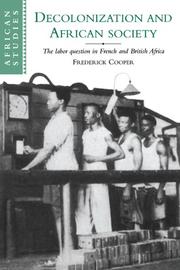
ISBN: 9780521566001 9780521562515 0521562511 0521566002 9780511584091 0511584091 0511089643 Year: 2005 Volume: 89 Publisher: Cambridge Cambridge University Press
Abstract | Keywords | Export | Availability | Bookmark
 Loading...
Loading...Choose an application
- Reference Manager
- EndNote
- RefWorks (Direct export to RefWorks)
This detailed and authoritative volume changes our conceptions of 'imperial' and 'African' history. Frederick Cooper gathers a vast range of archival sources in French and English to achieve a truly comparative study of colonial policy toward the recruitment, control, and institutionalization of African labor forces from the mid 1930s, when the labor question was first posed, to the late 1950s, when decolonization was well under way. Professor Cooper explores colonial conceptions of the African worker and shows how African trade union and political leaders used the new language of social change to claim equality and a share of power. This helped to persuade European officials that the 'modern' Africa they imagined was unaffordable. Britain and France could not reshape African society. As they left the continent, the question was how they had affected the ways in which Africans could reorganize society themselves.
Colonisation. Decolonisation --- Sociology of work --- anno 1930-1939 --- anno 1940-1949 --- anno 1950-1959 --- Africa --- Normalisation --- Labor --- Labor movement --- Labor unions --- Labor laws and legislation --- Decolonization --- History --- France --- Great Britain --- Colonies --- Colonial influence. --- #SBIB:96G --- #SBIB:HIVA --- Labor and laboring classes --- Manpower --- Work --- Working class --- Industrial unions --- Labor, Organized --- Labor organizations --- Organized labor --- Trade-unions --- Unions, Labor --- Unions, Trade --- Working-men's associations --- Societies --- Central labor councils --- Guilds --- Syndicalism --- Social movements --- Employees --- Employment law --- Industrial relations --- Labor law --- Labor standards (Labor law) --- Industrial laws and legislation --- Social legislation --- Sovereignty --- Autonomy and independence movements --- Colonization --- Postcolonialism --- Geschiedenis van Afrika --- Legal status, laws, etc. --- Law and legislation --- Syndicats --- Travail --- Mouvement ouvrier --- Décolonisation --- Afrique --- Grande-Bretagne --- Influence coloniale --- Décolonisation --- Histoire --- Droit --- Colonies françaises --- Colonies britanniques --- Influence coloniale. --- Arts and Humanities --- Labor - Africa - History - 20th century. --- Labor movement - Africa - History - 20th century. --- Labor unions - Africa - History - 20th century. --- Labor laws and legislation - Africa - History - 20th century. --- Decolonization - Africa - History - 20th century.
| Listing 1 - 10 of 38 | << page >> |
Sort by
|

 Search
Search Feedback
Feedback About UniCat
About UniCat  Help
Help News
News